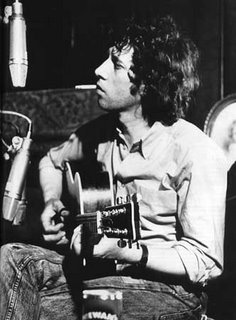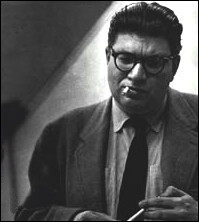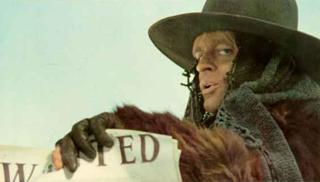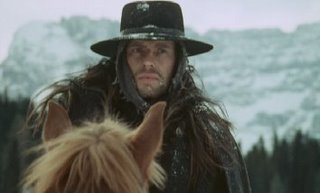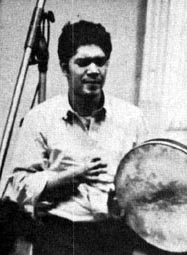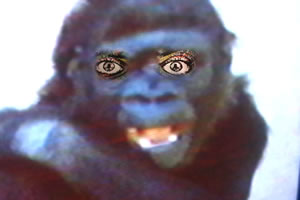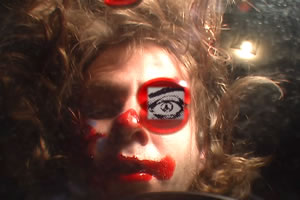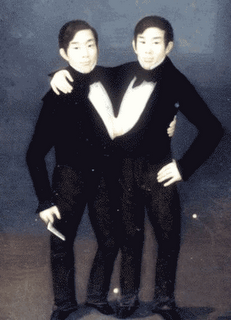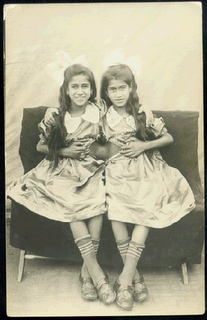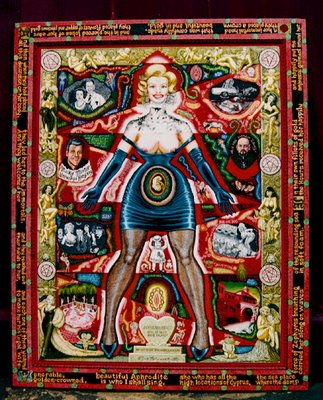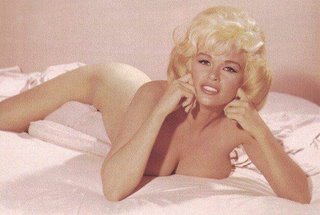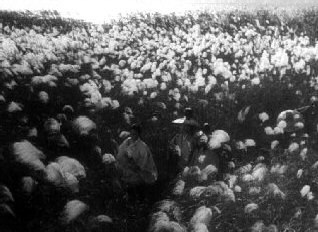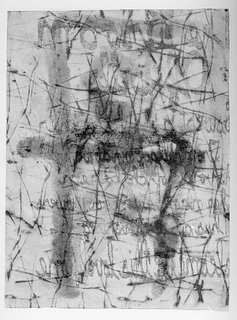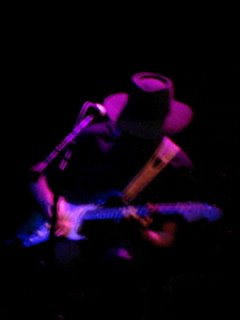
End of summer 2000, as "Pink Moon" fever sweeps across the psyches of emo kids via that VW commercial, inspiring Island to press up the Nick Drake discography once again, I'm in the record store with a friend of mine. She's buying Nick, while I peruse the stacks. I come across an odd-looking album: a woman in a baboushka and apron standing in the doorway of a house with a horse, cow, and dog painted on it. I'm not certain just what sort of name "Vashti Bunyan" is, but I see that Drake's producer Joe Boyd is on it, as is Robin Williamson from the Incredible String Band. I take it into the listening station at Waterloo Records and am floored by the hushed whisper that issues forth like some sort of secret. When I play it for my friend, she wrinkles up her nose, finding it too twee and fey. Best she stick to Nick Drake, I guess.
Overnight,
Just Another Diamond Day becomes a part of my mind, to where I have to play it at all hours: in the bright black of morning light, for afternoon delight, when day is done. Vashti evokes the hills and dales she herself was travelling, suggesting immaculate open spaces as well as the intimacy and warmth of a campfire in the evening's chill. Her songs were so small and beatific, like when a ladybug alights on your hand, when a butterfly dances past.
Since that date, countless others have felt similarly about her vespers and sighs, and as I anticipate her imminent arrival in the US, here is a long interview I conducted with her via email in the months preceeding her follow-up to
JADD,
Lookaftering. Pitchfork turned it down at the time (too obscure and no one cares, Ryan Pitchfork said), and it's sat in the limbo of the US version of Ptolemaic Terrascope for years now as well. And so:
Could you talk a bit about your upbringing? Songs you loved when you were young...I was brought up in central London, the youngest of three. My brother and sister were a lot older and looking back I think they were brought up 'properly,' whereas I was pretty much left to my own devices and so ran a bit wild. Post-war London was a great place to be allowed to run wild and this I did. Playing on bomb-sites, no-one really knew where I was alot of the time and I learned to get around by myself. Every so often my wild ways would come to my parents' attention and I would be brought to heel. The worst time was when I was sent away to a private girl's school in deepest countryside at the age of fourteen. I was horribly homesick for London and for freedom.
Did you grow up around much music?I have always loved music; my father had a large collection of 78rpm classical records, his favourites being Handel's organ music and Beethoven's Pastoral Symphony and the singer Kathleen Ferrier. She was my favourite, too, along with the choirboy Ernest Lough who sang "O For The Wings Of A Dove." I played these records over and over when no one was looking and got in big trouble for scratching them and blunting the needle. Records were very fragile then. I had wanted piano lessons but the family finances were always in trouble from my father's latest invention needing patent lawyers et cetera, so I taught myself or copied friends who did get lessons.
What was pop music like around that time?Popular music was staid and boring in Britain when I was very young, but the mid-fifties brought American music across: Elvis Presley, Buddy Holly, Ricky Nelson, Everly Brothers - I became fascinated by all of them. Their British equivalents, too: Cliff Richard, Billy Fury, Adam Faith, Johnnie Leyton. I saw the film
Expresso Bongo the night before being sent away to school and I think that seeded my wanting to be a pop-singer. It also brought the beginnings of young people taking on the music business for themselves in Britain - leading to the rise of the Beatles and the Rolling Stones in the early sixties. Which was good, as it was a quiet, boring time at the start of the sixties: Peter, Paul and Mary, Kingston Trio...even Elvis and Cliff were going soft.
I was brought up in London and so saw it in all its pre-sixties black and white post-war austerity and terrible disapproval of young people going against their 'elders and betters.' I also witnessed the way those young people took over for themselves. In the fifties, there were adults and there were children – nothing in between. Especially for girls. They all dressed in their mothers' style as soon as they were old enough. Being a teenager in the early sixties was like pioneering, all uncharted, exciting. A huge upheaval. Now the sixties are seen mostly for their psychedelic years but what took place before that – brave rebellion in the face of severe authoritarianism at the start of the decade – that was what paved the way.
Was this because of the Beatles and Stones and seeing that young people could be themselves and act in a manner different from their parents?Well...I remember the Beatles first appearing, but I wasn't that interested by them. It kind of felt like more of the same, only slightly better. But then I saw the Stones at a college dance and fell for Mick Jagger immediately. He was so scornful and aloof and the music was so raw and different and wild.
You saw the Stones when you were at Ruskin?No, this wasn't at Ruskin College. The dance I saw the Stones at was probably at Balliol College, and I think it was 1963.
And this was when you started playing?Yes, I was 18.
What were some of the first songs you learned? Buddy Holly's "Every Day" and Bobby Vee's "Sealed With A Kiss."
Was this around the same time that you met Jennifer Lewis and Angela Strange? Angela Strange was my godfather's daughter and we grew up together. Jenny Lewis and I met on the steps of the Ruskin School of Drawing on our first day back in 1962 and have remained friends ever since. She taught me to play guitar and we wrote songs deep into the night about how hard love is. I have a recording of the second song I ever wrote and it is painful to listen to...like finding your teenage poetry in an old box. Paul Lambden at Spinney is putting together a collection of all the first singles and demos from way before
Just Another Diamond Day. I have to think whether or not I dare put that 18-year-old's one on it or not.
And you began to perform out as a trio with Jenny and Angela? Yes, briefly, as 'The Three Of Us.' We did a few college dances and a charity ball at the Grosvenor House Hotel in London dressed in matching Mary Quant – singing Everly Brothers and Buddy Holly.
Was Ruskin progressive at all in terms of study or curriculum?No, Ruskin was a very traditional establishment. They taught drawing and life painting, still-life and composition – in a way it had been taught for generations. I was bored there. Playing guitar with Jenny was far more interesting. Staying in bed also. After two years the school despaired of me (for singing not painting) and I was asked to leave. They stayed on – so our musical paths went different ways. Both Jenny and Angela still live in Oxford.
Is it true that from your college days you had some sort of connection with Monty Python people?Yes, Michael Palin and Terry Jones were friends of Jenny and mine. They wrote and performed sketches while still students. They were always brilliant. Jenny still sees them from time to time.
What was the impact of other singers around that time on you? I'm thinking
specifically of people like Marianne Faithfull, Jackie DeShannon, but perhaps someone more folk-based, like Shirley Collins...When I first started writing songs, I was only aware of Carole King – whose songs I loved. I became aware of Marianne Faithfull when I came home from New York in 1964 after discovering Bob Dylan and making up my mind that I really wanted to be a pop singer and record my own songs. She had become very successful while I was away and I was a bit put out to see that she'd come close to doing what I wanted to do, even though she was not a songwriter.
I was never really aware of Shirley Collins at that time or Sandy Denny. I know their music now of course and admire them both – especially Sandy Denny. I think in general I never compared myself to anyone else if I could help it, nor did I follow or try to imitate any kind of style, and so it was – and still is – strange to be categorized with people I feel no musical affinity with at all.
At what point did you start performing on your own? Right after I was asked to leave Ruskin. Jennifer and Angela became a duo in Oxford while I headed off on my own in London. I sang in a few dingy night-clubs where no-one listened and they must have wondered what I was doing there in my scruffy black clothes, just me and a guitar and some sad little love songs. I never sang in folk-clubs – never occurred to me – I was not a folksinger.
Was that how you met up with Andrew Loog Oldham?Not in a club. I sang reluctantly at a party given by a friend of my mother's. She was an actress and there were many show-business people there – amongst them a theatrical agent called Monte Mackay. She knew Andrew Oldham and she must have reckoned he was looking for another girl singer since Marianne Faithfull had just left his management. I was summoned to her dark plush office and there was Andrew, looking fabulously beautiful and completely other-worldly – another world I wanted to be in. But I was there in my usual scruffy clothes and mournful expression probably and had no thought that he would be remotely interested. I sang my songs and was sent away.
When Monte told me Andrew wanted to have me record a Stones song I just didn't know what to do. I'd wanted to record my own songs and so sulked for a bit. Then he said I could put one of mine on the B side – and a second single could be one of mine. My father told me I should compromise – so I did. I completely loved the times recording with Andrew, and working out a song of mine with David Whitaker. So brilliant for me as I know nothing of music theory – and so to have real musicians playing my song felt fantastic.
Did you play many shows by yourself?While I was with Andrew's management I was not allowed to go on the road in case I got into drugs. Seems funny from here, but they were very protective of me for some reason. When I left Andrew to strike out on my own again, I did some live shows but not many. I always preferred writing and recording to performing.
Was this nearing the time you left London?Yes, around 1968.
What was drawing you to leave? I remember feeling desolate – I had not made my musical career work, there was even more family pressure to conform (get a job or get married) and the world outside was making less and less sense. Consumerism was taking a hold. The Vietnam War was craziness and too painful to watch, but I could not really identify my feelings of hopelessness. I wanted to somehow get to the realities of life and try to live differently than the way I had been brought up, which was this vacillation between being protected and disapproved of in equal measure. I also wanted to get as far away from London as I could, for it was filled with musical failure for me.
Can you tell me how you met Donovan? He was an old school friend of my boyfriend, Robert, at the Art College. I met him a few times when visiting these friends of Robert's. He was around when Robert and I were trying to get the money together to buy the horse and wagon we had found, and he lent us what we needed, and we stayed at his house just north of London whilst we prepared the old wagon for the journey.
Tell me more about this proposed artist's commune he was trying to settle. Why did it disperse?Robert and I were not really in on the plans, we just thought it would be a good idea to head towards Donovan's dream of an idea – a loose community of like-minded people who would probably be painters, writers, musicians. He said it would be a West Coast Renaissance. Donovan and his friends went up in a Land Rover in the summer of '68 just after Robert and I set off with the wagon. They spent two summers and a winter digging the ground and experimenting with self-sufficiency while we spent the same time traveling north. By the time we got there Donovan was no longer living there (though he just happened to be there when we arrived) and most of the others had decided to return to the city. Two resolute friends are still there though – they lived the life, brought up the children and made the dream a reality.
Was the horse and carriage part of a complete renunciation of modern life? Yes in a way – although it was all we could afford to do at the time. We had very little money between us and nowhere to live, so it seemed to be a good idea. Once the thought came – we found the horse and the wagon quite miraculously. I didn't really have much idea of renouncing anything – I had no great political ideals or philosophy to follow. I was just trying to find a way to live that felt all right.
It must have been a rough change. Did you quickly acclimate to life on the wagon? Well, we had been living under a piece of canvas in a wood behind Robert's art school while he prepared his degree show. That was the rough change – from my parents' house in London. Having the wagon was a step up as it meant we then didn't have to sleep on the cold ground any longer. Being up in the air was good. The wagon was too small for a stove so we got cold and soaking wet many nights. I cooked on an open fire on the ground and we lived on very little, earning money by digging gardens and painting farmyards and collecting scrap metal to sell. It was not comfortable and sometimes I felt like going home, but then these responsibilities came forth: who then would look after the horse? who would look after the dog? who would carry on the dream?
What made it worthwhile for you?When the sun came out, when we made good progress, then it was the best feeling in the world. We met some wonderful people and had adventures that if I were to write them down people would think I'd made them up. Other times when it was cold and I missed my family – not so good.
How did this lifestyle begin to affect your songs? Was there a metamorphosis that was made evident in your mind with these new songs?My first songs had been about how hard love is and how it can go so wrong. Sad teenage songs. Andrew Oldham put orchestral backings to some of them. I like these versions. It has been said that Andrew took me down a road I didn't want to go down, that I was a quiet folk-singer and that he drowned my little songs with his own take on them.
This is not true!! I wanted the orchestras and the big arrangements, I loved that treatment of the quiet songs, but when it didn't work out for me I went back to singing on my own with just a few instruments. But I was never a folk-singer.
When I first met Robert, he persuaded me that my songs were just miserable and that I should look outside myself. And so I did, and I started writing songs about what I saw and telling the story of our road life. I didn't think the songs would ever be recorded as I had left the music industry behind me for good I thought - so they were just a kind of diary. Joe Boyd changed all that but even so I left it all behind again, really for good this time. Till now, at least.
What was recording Just Another Diamond Day
like?It sped by in a blur and I don't think either Joe Boyd or myself can remember much about it. I just sang the songs as I always sang them. Only three or four days actual recording – over a few weeks. I do remember that he wouldn't let me use any overdubs or trickery of any kind which annoyed me a bit. I wasn't the same kind of purist as he was. I would have liked to experiment more. He was probably right.
Did it feel weird to come back into the city after so much time in the countryside? Yes – it was like coming home after a self-imposed exile. I loved living in the country – it had been my childhood dream and I spent 25 years there – but I grew up in the centre of London and even removed from it now, I still feel like that is where my centre is.
Were you more certain of your songs this time around? Or were you still worried about musical failure?I hadn't intended to record them when I wrote them – I would just play my guitar out of habit whilst traveling and the songs just came to me on the wagon. I wasn't worried about whether they would fail or not as I was quite sure no one would ever hear them except Robert and myself, and the horse, Bess. Then when I was recording them, I still didn't think many people would be interested enough to hear them.
Can you tell me anything about playing with Robin Williamson from the Incredible String Band or Dave Swarbrick or Simon Nicol from Fairport Convention?Robin's playing on "Rosehip November" was like a small miracle to me. We did it in just a few takes, it wasn't rehearsed and so I can't imagine ever trying to play it live. It had such lightness of touch from everyone.
Playing with Dave and Simon was a very good experience for me. I had never played with anyone like that before. It was great to hear them pick up my songs so quickly and run with them. I was a bit over-awed really and was sure they'd think the songs too small and unworldly. They were kind though.
What did you think of JADD
when you had finished it? I didn't hear it for some months during which time I was in the Hebrides or in London having a baby and Joe was in the US. He took the tape over there for mixing so I had no input from then on, apart from choosing the running order.
When I heard it again, I was worried about the handmade sound of it, all the wrong notes that I would have taken out but that Joe left in, and I thought it had missed the small window of opportunity that it would've had when the songs were first written. By 1970, the gentle dream had come and gone.
What was the critical response to it at the time? I only read one review and it was enough to send me back to the hills for the next twenty-five years. Recently, a friend unearthed some other reviews from the time and they were much kinder. Maybe if I'd seen them then I wouldn't have given up so readily, but I completely closed it all down, and didn't play for ages.
And what happened afterwards? Did you and Robert settle down at some point? I don't know that we settled down exactly. Our lives just went from day to day and we never expected to stay together for the twenty-two years that we did. We lived in various rented farmhouses in Ireland and then back in Scotland and eventually after fifteen years we bought a ruined farm north of Glasgow. We spent the next few years building it back up with the help of many different people – some who came by for a few days and stayed for years, others who visited from time to time. Robert and I separated in 1991 and we both now live in cities, but remain friends. We went through a lot together and nothing changes that.
We had three children: Leif (who lives in Los Angeles) and Whyn (she now lives in the row of cottages where I lived with the Incredible String Band when Leif was a baby) and then Benjamin who arrived when I was 41. He's on a basketball scholarship in the US – a very different child to Leif and Whyn. Another generation – but they're all close.
Did you continue to play and write?The way we lived meant that there were many people passing through, some of them musicians, including the Incredible String Band, but I could never admit to my own musical past and so I would not join in with any music that was being played. My lovely old Martin guitar just gathered dust on the wall.
So some thirty years on, are you surprised at the amount of love and respect Just Another Diamond Day
has garnered over the years?
Very surprised. When I haven't thought about it for a while and then remember its existence, my heart leaps – it's like I'm living in a different life, another world. As if the album has had a life of its own quite separate from me – that I abandoned it and it has now found its way back to me and asked, "Oi! What about me, then?"
What is it like to meet fans such as Devendra Banhart, Kieran Hebden, the Animal Collective, and to record with this new generation?Devendra, Kieran, Adem, all the Animal Collective and Dave at FatCat and Max Richter...and the many others I've met since coming back to music – they are who I didn't have around me back then. They are who I longed for back then.
Is it good to be back?It's like being given another go at it when I really don't deserve it – the way I ran off and denied
JADD for so many years. I am overwhelmed. But yes, it's good to be back, more than I can ever say.






